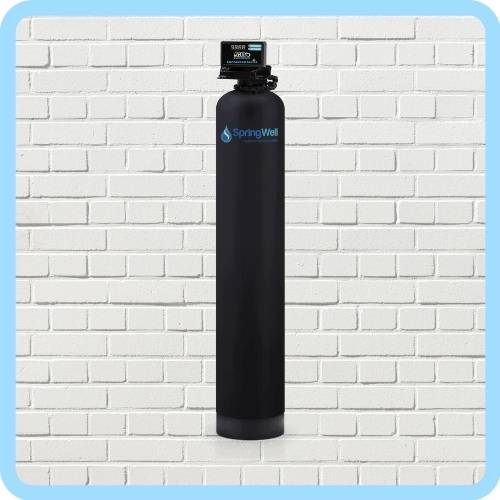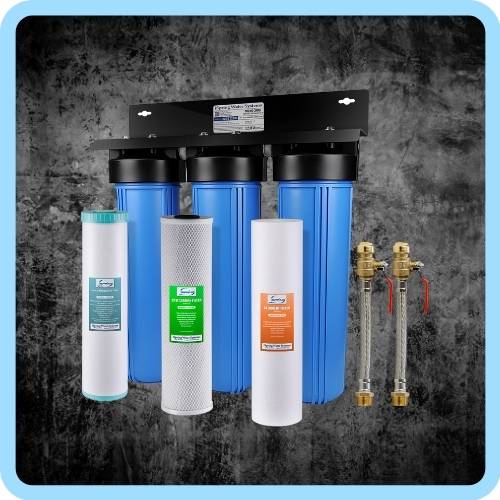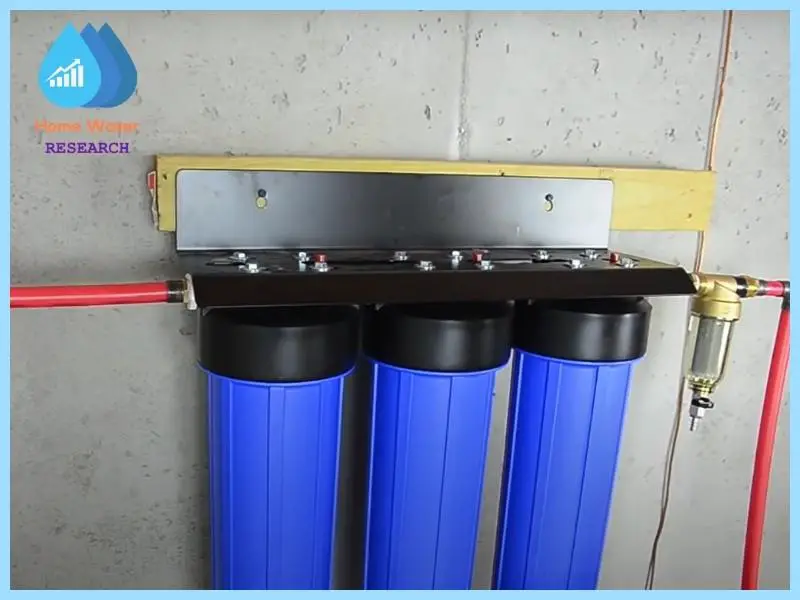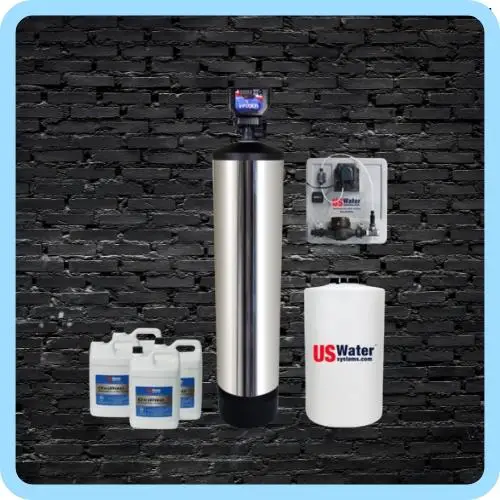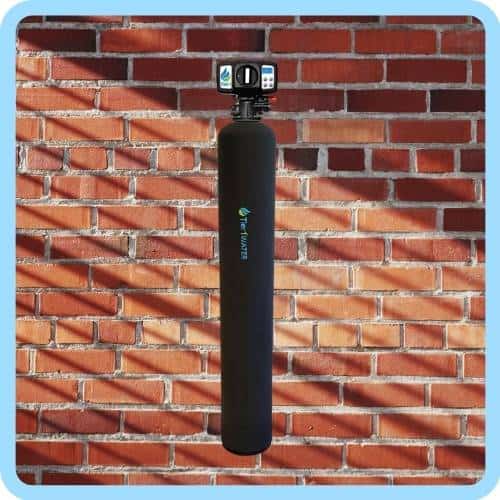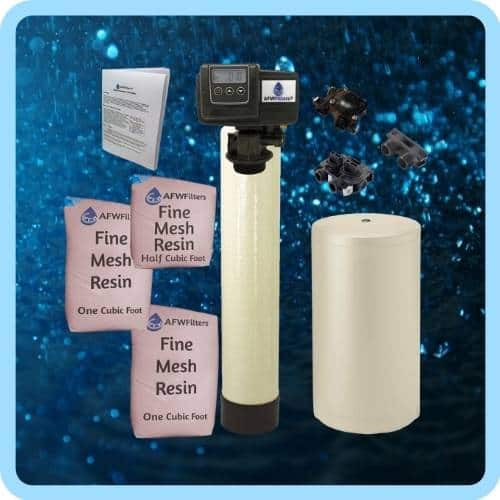Best Overall
7 PPM Iron (high enough for most
No chemicals used
Customer service
Best for High Iron
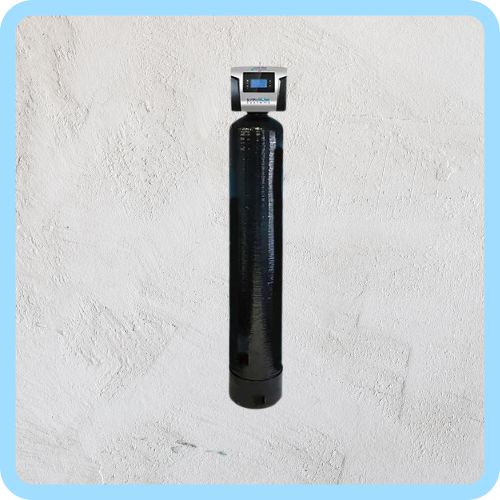
Deals with
30PPM iron
Chemical-free
Great value
Best Budget Iron Filter
Very affordable
Small
Only up to
3PPM iron

Seven years ago I didn’t even know what iron, manganese, and hydrogen sulfide were. Fast forward to today and I’ve researched and reviewed over fifty different water filter systems, including dozens of whole house water filters.
To choose the best iron filter for well water, you need to match the system to your water’s quality – paying particular attention to iron and manganese levels. Then look for a flow rate high enough for your needs, and a distributor offering a generous warranty and customer support.
The best whole house water filter for well water without chemicals is the SpringWell Well Water Iron Filter. It’s an extremely thorough filtration system for up to 7PPM of iron and also comes with a lifetime warranty and a 6-month money-back guarantee. For very high iron levels up to 30PPM, try the SoftPro Iron Master AIO Iron Filter.
Our top six whole house iron filters for well water
Best Iron Filters for Well Water
- Springwell Well Water Filter: Iron Removal Air Injection System
(Best Overall & Best Air Injection System) > See review - SoftPro Iron Master AIO Iron Filter
(Best for High Iron Levels up to 30PPM) > See review - iSpring WGB32BM 3-Stage Whole House Water Filtration System
(Best Budget Iron Filter System) > See review - US Water Matrixx Infusion Iron Filter System
(Best Alternative for High Iron) > See Review - Tier1 Whole House Water Filtration System for Iron, Manganese, and Hydrogen Sulfide Reduction
(Cheapest Air Injection System) > See review - AFWFilters Iron Pro2 Fine Mesh Water Softener
(Best Water Softener for Iron Removal) > See review
We’ve also written a buyer’s guide to help you sort through all the best iron filters for well water on the market. Jump to the section you need using the table of contents below.
Clean drinking water here we come!

Six Best Iron Filters for Well Water Reviewed
Here are six reviews. Each of these five well water filtration systems is suitable for specific water quality, household size, or budget.
Best Overall & Best Air Injection Iron Filter
- Price: $$$$
- Iron Filtration: air-injection oxidization
- Iron level: up to 7PPM
- Also removes: manganese, hydrogen sulfide,
- Flow rate: 12GPM (1 – 4 bathrooms) / 20GPM (4+ bathrooms)
- Warranty: Lifetime warranty / 6 month-money back guarantee
Pros
Efficient & effective
Chemical-free
Customer service & support
Cons
May need a pro to install
App required for advanced settings
Our favorite air-injection oxidizing iron filter for well water is the Springwell Whole House Well Water Filter System.
This air-injection oxidizing iron filter is a master at removing both ferrous iron (clear water iron) and ferric iron (red water iron) up to levels of 7PPM. It is ideal for nearly all iron-related water issues, barring the most severe cases.
The Springwell system is a single-tank setup, which brings with it several benefits. Not only is it incredibly efficient, but it also operates without the use of chemicals and requires almost no maintenance. Once installed, you can sit back and enjoy the clean, clear water it delivers.
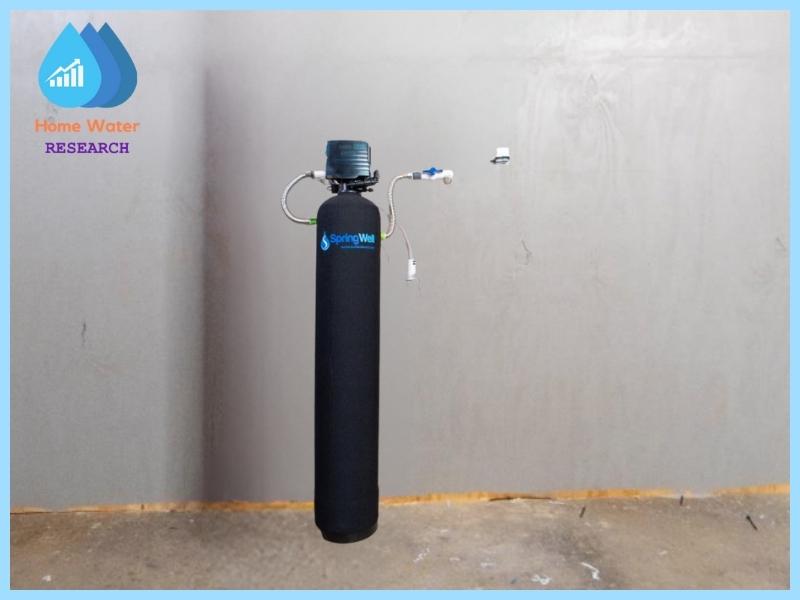
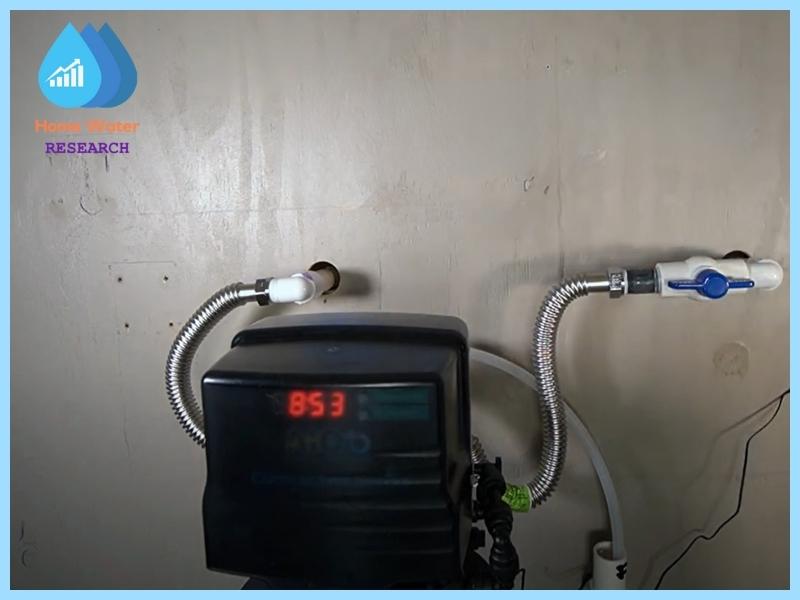
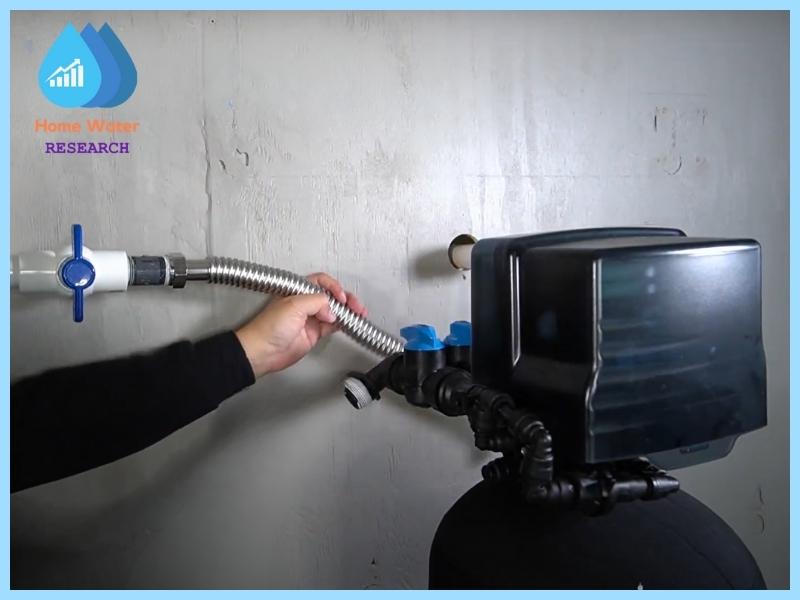
In addition to iron, Springwell’s air injection oxidizing iron filter system is also capable of removing hydrogen sulfide and manganese. It accomplishes this by injecting water with oxygen, a natural process without chemical additives. This makes it a cost-effective and eco-friendly alternative to buying bottled water.
As for flow rate, the lowest option is 12GPM. In our experience, this is sufficient for a three-bathroom house. So, even when everyone in our household decides to take a shower at the same time, there’s no drop in water pressure.
Installation might require professional help unless you’re particularly handy. But if you decide to tackle it yourself, we found Springwell’s installation guide to be one of the most user-friendly. It includes full-color pictures and simple instructions, which can significantly simplify the process.
One of the features we love about this system is its easy-to-use Bluetooth app. This allows you to adjust valve settings and initiate cycles directly from your smartphone. I really appreciate the ability to monitor our water usage and access historical data.
Reviews from homeowners who have installed this system are overwhelmingly positive. One reviewer mentioned their water was orange and had an unpleasant smell before installing the Springwell system. But after installation, the smell and the staining was completely gone.
Another user noted the system’s backwash process is quiet, avoiding disturbances during early morning cycles.
It’s important to note that this system doesn’t remove tannins. However, it’s one of the best deals out there for a whole-house iron filter for well water, and it comes with an industry-leading 6-month money-back guarantee.
You can find more information on Springwell’s website.
Best for High Iron Levels
- Price: $$$
- Iron Filtration: Air Injection Oxidation (AIO) Technology
- Iron level: up to 30PPM
- Also removes: manganese (up to 7PPM), and hydrogen sulfide (up to 5PPM), improves pH to 7.0+
- Flow rate: Minimum 5GPM required
- Warranty: 6-month money-back guarantee
Pros
Highest iron removal (30PPM)
Chemical-free
Great value
Cons
Manual could be clearer
Minimum flow rate
–
The SoftPro AIO Iron Master Filter, is our “Best Filter for Very High Iron Levels”. We’ve seen this system provide a lifeline for homeowners grappling with super high iron levels – as high as 30PPM – higher than any other filter we’re aware of.
It’s our go-to solution for people struggling with the side effects of super high iron levels, such as stained laundry, rusty pipes, and that off-putting metallic taste that ruins your morning coffee.
The SoftPro AIO Iron Master Filter uses Air Injection Oxidation (AIO) Technology. This chemical-free iron removal method is efficient and eco-friendly, making it a popular choice among environmentally conscious homeowners.
We’ve seen significant improvements in water quality in homes using this system. The system doesn’t just stop at iron; it also eliminates manganese (up to 7PPM) and hydrogen sulfide (up to 5PPM). Additionally, it elevates your water’s pH level to a healthier 7.0 or above. This means you no longer have to stress about the corrosive effects of acidic water on your pipes and appliances.
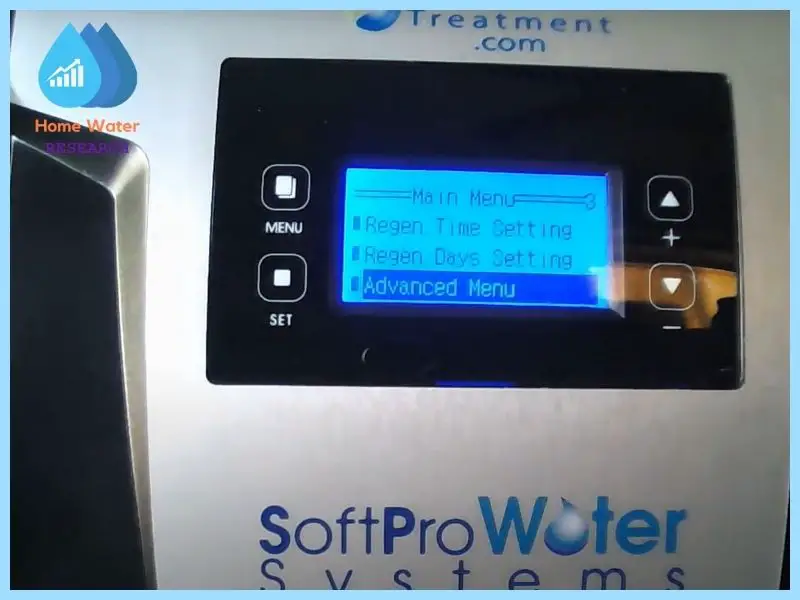
Let’s put this into perspective with other products on the market. When compared to the Matrixx Infusion Iron & Sulfur Removal System or the Pelican Water Iron & Manganese Water Filter, the SoftPro AIO Iron Master Filter offers the highest iron removal at a lower price. The SoftPro system gives you a competitive edge with its reasonable price without sacrificing performance.
Before you hit the ‘buy now‘ button, remember one critical point: the system requires a minimum flow rate of 5 GPM to function effectively. And larger systems need a higher flow rate. So, checking your well pump’s flow rate before purchasing is essential.
The SoftPro AIO Iron Master Filter has a 6-month money-back guarantee. In the unlikely event you’re unsatisfied with the system, you’re covered. We’ve found that this guarantee gives users peace of mind and confidence in their purchase.
We believe the SoftPro AIO Iron Master Filter is an exceptional choice for homeowners dealing with high iron levels in their water. It’s efficient, affordable, and backed by positive user reviews. So, if you’re ready to bid farewell to stained laundry and rusty pipes, this system could be your new water hero.
Best Budget Iron Filter for Well Water
- Price: $
- Iron Filtration: catalytic media cartridge (chemical-free)
- Iron level: up to 3ppm
- Also removes: chlorine, chloramines, sediment
- Flow rate: 15 GPM (up to 5 bathrooms)
- Warranty: 1-year manufacturer warranty
Pros
Very affordable
Removes iron & chlorine
Compact & easy to install
Cons
Only for low iron levels
Need to replace cartridges
–
Our award for the Best Budget Iron Filter for Well Water goes to the iSpring WGB32BM 3-Stage Whole House Water Filtration System. We found this to be an excellent choice, particularly for those on a tight budget.
Despite its affordability, the system doesn’t compromise on performance. However, it’s essential to note that it can only remove up to 3PPM of iron from your water. If your home suffers from high levels of iron contamination, this may not be the right fit.
The WGB32BM operates via a three-stage filtration system. The first stage utilizes a 5-micron polypropylene sediment filter to remove dirt and larger particles from the water. The second stage features a 5-micron CTO coconut shell carbon filter, capable of removing up to 99% of chlorine, bad tastes, odors, pesticides, herbicides, and chemicals.
The third stage is where the WGB32BM truly shines. This stage houses an iron and manganese-reducing filter designed to eliminate heavy metals often found in well water sources. This feature is exclusive to the WGB32BM model. So, remember to double-check the model number before making a purchase.
Despite being a budget-friendly system, the WGB32BM boasts an impressive flow rate of 15GPM, making it suitable for larger households. However, installation may require a medium level of plumbing experience. If you’re comfortable with basic tools, we found the provided installation videos pretty good at guiding us through the process. Alternatively, a professional plumber should have the system up and running in a few hours.
It’s important to clarify that despite being a three-stage cartridge system, the WGB32BM does not soften water or reduce total dissolved solids (TDS). Additionally, the cartridges will need to be replaced regularly. The stage 1 sediment filter and the stage 2 carbon filter block cartridge should be changed every 12 months or 100,000 gallons. As for the iron and manganese filter, you’ll need to replace it roughly every 6 months or 50,000 gallons.
If you’re on a budget, dealing with low levels of iron or manganese, and seeking cleaner, better-tasting water, the iSpring WGB32BM 3-Stage Whole House Water Filtration System is a fantastic choice.
Best Alternative for High Iron
- Price: $$$$
- Iron Filtration: hydrogen peroxide injection
- Iron level: up to 20ppm FE
- Also removes: sulfur, manganese, silt, sediment
- Flow rate: from 10GPM (1 – 3 bathrooms) to 25GPM
- Warranty: Lifetime (tank), 10 years (carbon filter valve & electronics),
5 years (injection panel)
Pros
Effective with iron to 20PPM
Intuitive smart app features
Very effective with sulfur
Cons
Higher price
May need pro. installation
Cost to replace H202
The Matrixx Infusion iron filter system is another option for dealing with very high iron levels. While it’s a good system, we’d generally recommend the SoftPro IronMaster, which can deal with higher iron levels at a lower price. This system efficiently eliminates iron up to 20PPM (compared to the IronMaster’s 30PPM), which helps rid your bathroom of those persistent orange stains.
The Matrixx Infusion system employs continuous injection technology, introducing hydrogen peroxide (H2O2) to oxidize iron. This process is so effective that it can handle extreme iron levels (up to 20PPM). Experts also widely recognize this method as the most effective way to eliminate sulfur smells.
We think the WaterLogixx app is a useful tool for managing the system. This app controls the valve and allows you to monitor the system’s performance. The setup process is straightforward and took us around ten to fifteen minutes to install and get used to it. The app also provides options for tracking your water usage and system performance.
Installation of the Matrixx Infusion system is recommended to be carried out by a professional to ensure compliance with local plumbing and electrical regulations. However, we found the manual provided clear step-by-step instructions, complete with pictures, for those who prefer DIY.
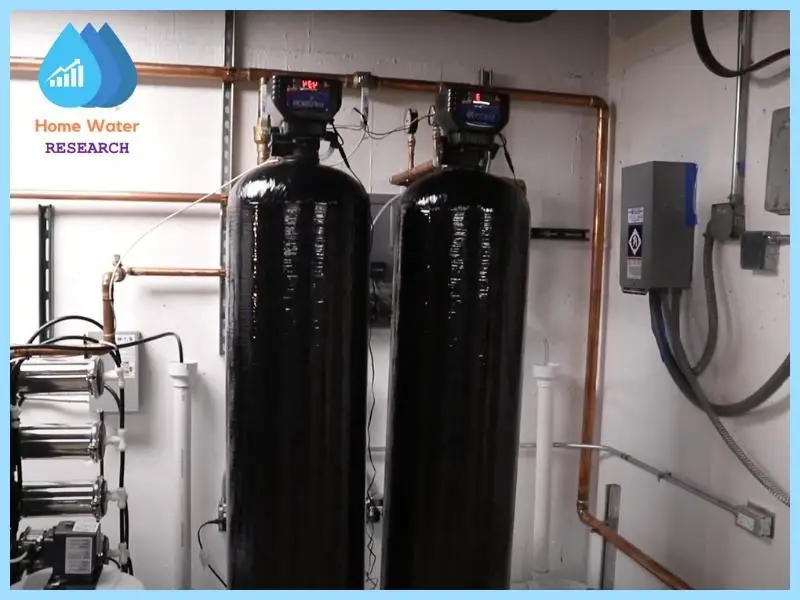
One potential downside to the Matrixx Infusion system is the initial cost. It’s a high-end system, but the price is comparable to similar models on the market. Considering the level of performance and support US Water Systems provides, we’d say the cost is justified.
Operating costs will include topping up the hydrogen peroxide (which should be checked and topped up as required). US Water Systems estimates that an average family would use 20-30 gallons per year. If you choose to use their OXIPRO 7 brand, you can expect to pay around $340 a year, although shopping for alternative brands could save money.
While the Matrixx Infusion system is more expensive to operate than air-injection or chlorine-based systems, it’s a powerhouse for removing iron, manganese, and sulfur. It’s also more suitable for a wider pH range than other models. If you’re struggling with orange stains and discoloration, the Matrixx Infusion system, available at USWaterSystems.com, may be the solution you’ve been searching for.
Best Budget Chemical-Free System
Tier1: Whole House Water Filtration System for Iron, Manganese, and Hydrogen Sulfide
- Price: $$$
- Iron Filtration: air induction oxidation & granular activated carbon filter
- Iron level: over 4PPM
- Also removes: manganese and hydrogen sulfide
- Flow rate: 5.8GPM (1 – 2 bathrooms)
- Warranty: 5-year limited warranty
Pros
Budget-friendly
Simple & effective
Chemical-free
Cons
May need pro. installation
Complex manual
–
In our search for a budget-friendly air induction oxidization (AIO) system for iron removal, we found the Tier 1 Whole House Water Filtration System to be a standout. It’s an excellent solution for households dealing with iron levels of around 4PPM.
While it primarily filters ferrous (clear-water) iron, the most common type found in water, it also removes manganese and hydrogen sulfide. This makes it suitable for most people seeking a comprehensive filtration system.
The system’s flow rate, clocking in at 5.8GPM, may be lower than some other systems, but it’s more than sufficient for households with two or three bathrooms. Plus, the lower price point makes this a fantastic value proposition.
The Tier1 system employs a two-step filtration process. First, a sediment pre-filter removes dirt and rust before iron particles reach the iron filter. This is crucial as dust and debris can clog up the iron filter, compromising its effectiveness.
Next, the air induction oxidation begins. The system uses compressed air to infuse the incoming water with oxygen. A bed of carbon media then filters the water and serves as a physical barrier. Once the air is used up, the system regenerates, carrying the iron out with the flowing water and away from the system through a drain. This process repeats itself, meaning it only regenerates when necessary, thus saving water and energy.
Controlling the system is a breeze, thanks to the Back Washing Control Valve that sits atop the iron filter tank. It’s simple to adjust cycle times or monitor your water usage statistics directly from the system. For those who prefer straightforward, hands-on controls over complicated smartphone apps, this is a dream come true.
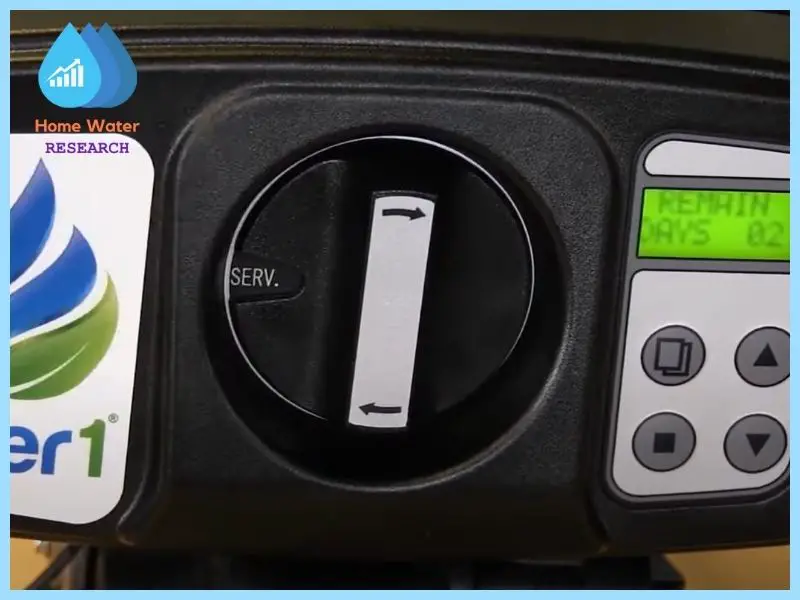
However, the instruction manual can be a bit technical. So, we recommend having an experienced plumber install the system, especially if you’re unfamiliar with your state’s plumbing standards and regulations.
In our experience, the Tier1 Whole House Iron Filter for Well Water offers a simple, effective, and chemical-free way to remove ferrous iron from your drinking water. It’s a fantastic solution for homeowners who want to improve their water quality without breaking the bank.
So, if you’re tired of dealing with discolored, bad-smelling, or bad-tasting water, head on over to Amazon and check out the Tier 1 system.
Best Budget Filter & Softener Combo for Iron
Pros
Removes iron & scale
Softens water effectively
High flow rate
Cons
Less effective on ferric iron
Perioidc salt-level checks
–
If you’re battling the dual issue of hard water and high iron levels, the Iron Pro 2 is a stellar solution. This high-quality water softener can tackle both problems, removing iron levels from 4 – 7PPM and eliminating scale from your water.
Imagine a life free from the constant scrubbing of red stains and scale from your showers, toilets, and pipes. That’s what the Iron Pro 2 offers.
However, it’s worth noting that this system is most effective for removing ferrous iron and only a small amount of ferric iron. If high ferric levels are your main concern, consider the Pelican iron filter for well water instead.
The Iron Pro 2 also improves the taste of your water. Many users have reported noticeable taste improvements in this system’s iron-free, soft drinking water.
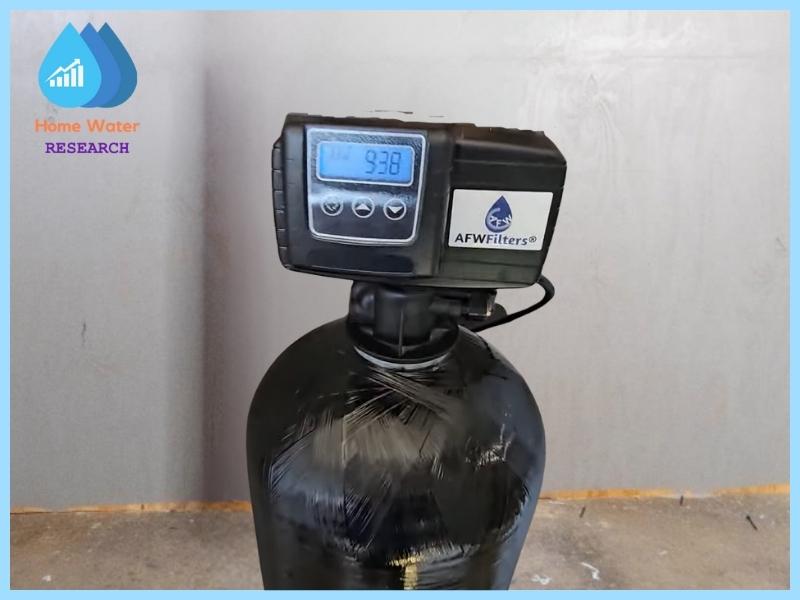
Designed with a flow rate of 16GPM, this system can accommodate larger households with more than three bathrooms without any pressure drop.
The Iron Pro 2 system is a versatile water softener that removes hardness (up to 75GPG), ferrous iron, and manganese (6ppm) from your well water. Its 64,000 Grain capacity sets it apart from other systems on the market, making it a durable and long-lasting solution for those dealing with very hard well water.
Installation is comparable to other water softeners, requiring a hole for the bypass valve and a route for cold water from your main supply line. While the manual isn’t available online, we found a helpful YouTube video guiding us through the process. However, be aware that the system’s pipe sizes aren’t clearly stated, so you should visit the hardware store to ensure all your connections match up.
As with all water softeners, you’ll need to check the salt levels about once weekly and replenish as needed.
In summary, if you’re dealing with hard, iron-contaminated well water, the Iron Pro 2 could be the solution you’ve been searching for. It’s an investment that can save you time, enhance the quality of your water, and potentially extend the lifespan of your pipes and appliances. Check out more details now.
The Ultimate Guide to Deciding Which Iron Well Water Filters Are Right for your Well
Choosing an iron water filter for wells can be a daunting task. With so many iron filters on the market and different types of iron filtration, it’s hard to know what factors are important when choosing one.
This section will walk you through the considerations that need to be made before purchasing an iron water filter for wells.
What kind of water quality do you have?

To choose the right kind of iron filter for your well, you need to know what kind of water quality you have.
The iron water filters available on the market work differently depending on what kind of iron you’re dealing with. One type of iron filter, for instance, will not remove certain types of iron that another might take care of. Some can remove hydrogen sulfide and sediment. Others can’t.
There are three main kinds of iron found in water [2]. They are
- ferrous iron (clear-water iron);
- ferric iron (dirty, red-water iron);
- and organic iron (can be clear, or yellowy-brown).
Your choice of iron filtration method will depend on which of these are present in your water. How deep your well is will have an impact on this.
Iron water filters have different treatment capacities, so you need to know how much iron is in your well water before choosing a filter.
Iron levels above 0.3 PPM are usually considered offensive in water [3]. It’s unusual to find water sources above 10 PM in water, but it can happen. Make sure to choose an iron filter that matches the iron levels in your water.
There could also be high levels of other substances in your water like chlorine, nitrate, or fluoride. Or you may need an acid neutralizer for your well water to reduce pH. If this is the case you may need to consider an additional stage of filtering, to work alongside your iron filter.
Most iron filters for well water will come with a sediment filter installed as a pre-filter, if not you should add your own.
Tannins can also be a problem, and require separate filtration solutions.
So if you’ve noticed discoloration or black sediment in well water, look into getting a water quality test carried out so you can be sure.
What type of whole house iron filter should you choose?
Once you know your water type, you can choose an iron filter based on your water quality test results.
For very high levels of ferrous iron, a manganese greensand filter is usually the best choice and can be effective for levels up to 10 to 15 ppm [4]. Water softeners and air injection oxidization can also remove ferrous iron, but only at lower levels.
For ferric iron, manganese greensand filters, and chemical oxidation can both be effective.
For organic iron, a chemical oxidant injection system with additional filtration may be needed.
If you have hard water, or additional contaminants many manufacturers sell combos (eg. a water filter and water softener combo that work together).
Flow rates
The flow rate is how much water your iron filter will produce in one hour. Larger homes or families with more people may need a higher flow rate iron filter.
Flow rate is usually measured in GPM (gallons per minute).
If you don’t have a large enough flow rate you’ll experience poor water pressure. And this will get worse the more water appliances that are in use at the same time.
Broadly speaking 7-8GPM is enough for a small house with one or two bathrooms. For three bathrooms you need around 10 – 12 GPM. For four or more bathrooms, consider a system capable of 15GPM.
Installation
Consider if your water filter will be installed inside or outside.
If you’re installing your iron water filter outside, you will need to consider casing to protect it from the elements.
Iron filters that have cartridges need to be changed regularly, so make sure there is nothing obstructing access. It’s a good idea to select a position near the main water shut-off valve.
If you’re not comfortable doing the installation yourself it’s worth hiring a plumber to do it for you. This will save time and protect your investment in your iron filter system.
Maintenance
The great thing about most iron filters is that they don’t need any maintenance.
Greensand and air-oxidization iron filters can be set to have an automatic backwashing process, so you do not need to worry about maintaining the system.
Cartridge-based iron filters will need regular changing. And water softeners need regular salt top-ups.
Lifespan
The lifespan of iron filters will depend on the kind you have.
Greensand and air injection iron filters are long-term systems, with a system expectancy of somewhere between 15 to 20 years. Greensand media is expected to last from four to eight years, but it’s easy to replace [5].
These systems are usually installed outside though, so they need protection from harsh weather conditions such as rain or snow.
Cartridge iron water filters can last for up to five years if needed. Although most only last between 6 months and a year. They’ll often be much cheaper, but you should factor in the cost of replacing these iron filter cartridges around twice per year.
Chemical oxidization systems and water softeners usually last about ten to fifteen years, as long as regular maintenance is carried out
What is iron in water and why remove it?
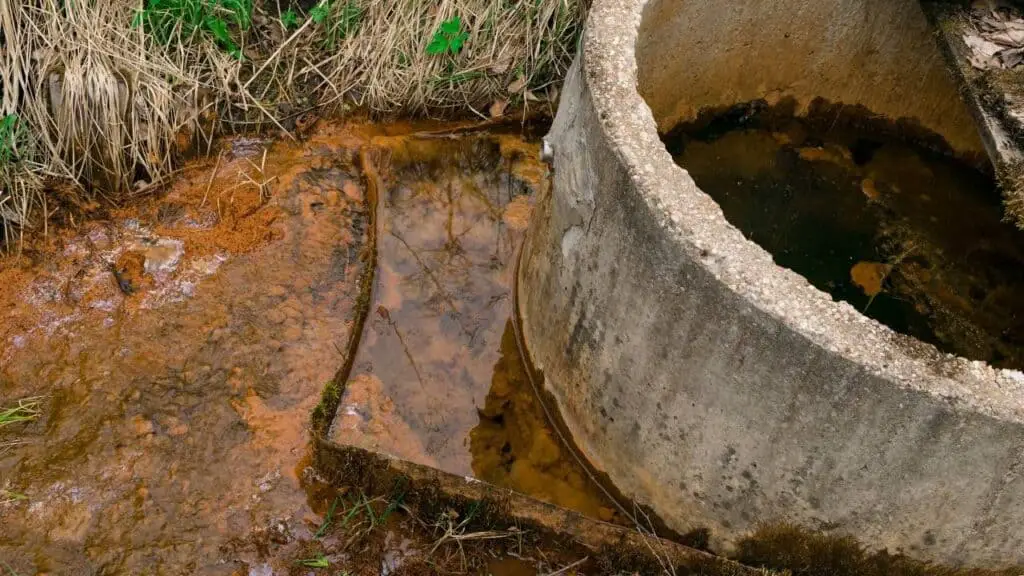
Iron is a naturally occurring mineral in groundwater and well water. It’s not usually harmful to drink, but iron can cause staining and bad taste from tap water or well water that has high iron content.
The three main types of iron present in water are:
- ferric iron;
- ferrous iron;
- and organic iron.
When iron dissolves it forms ferrous iron (Fe+), which reacts with oxygen to form ferric iron (Fe++). Ferric iron cannot dissolve into the water so the next step of oxidation releases two hydroxyl ions per one Fe++, turning insoluble ferric iron back into soluble ferrous ions. This process creates hydrogen gas bubbles as part of what we call “rusting”. And these bubbles can give off an unpleasant odor when they release through drinking faucets or clothes washers [6].
Organic iron comes from the breakdown of organic matter in water, such as decaying leaves and animal waste. This iron is considered non-toxic but it does not dissolve well so it often forms black particles that can clog a filter cartridge or other parts.
If you have iron in your drinking water, it’s probably causing some kind of negative effect. So that’s why you’re considering an iron filter for your well water.
Health effects of iron in water
What are the health effects of too much iron in drinking water?
Poor skin
For some people, iron causes skin issues. Iron can make skin dry, red, and flaky.
Some people find iron in water causes their scalp to itch or become irritated.
Iron may also be associated with causing acne breakouts for some people.

Iron overload (hemochromatosis)
Some people have a genetic disorder called hereditary hemochromatosis [7] that makes them unable to break down iron properly and this leads to health problems such as liver disease or diabetes. This condition is rare though.
If iron in water is affecting the way you feel, or if your child seems to be experiencing iron overload symptoms such as pale skin and dark circles under their eyes, it’s worth asking a doctor for iron tests.
Side effects of iron overload include hair loss, fatigue, and joint pain.
Iron bacteria may grow
Iron bacteria thrive in iron-rich environments like well water, and they can’t survive without iron. They’re not dangerous for humans though. This is because the amount of rust that these organisms produce is only enough to have a mild effect on iron levels in drinking water (it’s unlikely you’ll experience symptoms).
However, iron bacteria can help other types of bacteria grow. And of course, these can be dangerous for humans.
Bad-tasting, unappetizing water
Iron has a metallic taste that can be unpleasant. Iron also reacts with oxygen to form iron oxide, which is the substance in water that turns it brownish yellow and gives it an earthy smell. This iron oxide causes a bad odor through clothes washers or faucets too.
This isn’t a health problem as such. But it probably means you’ll want to drink less water. And we all know how important it is to drink at least eight glasses of water a day.
Effects of Iron on Household Fixtures and Appliances
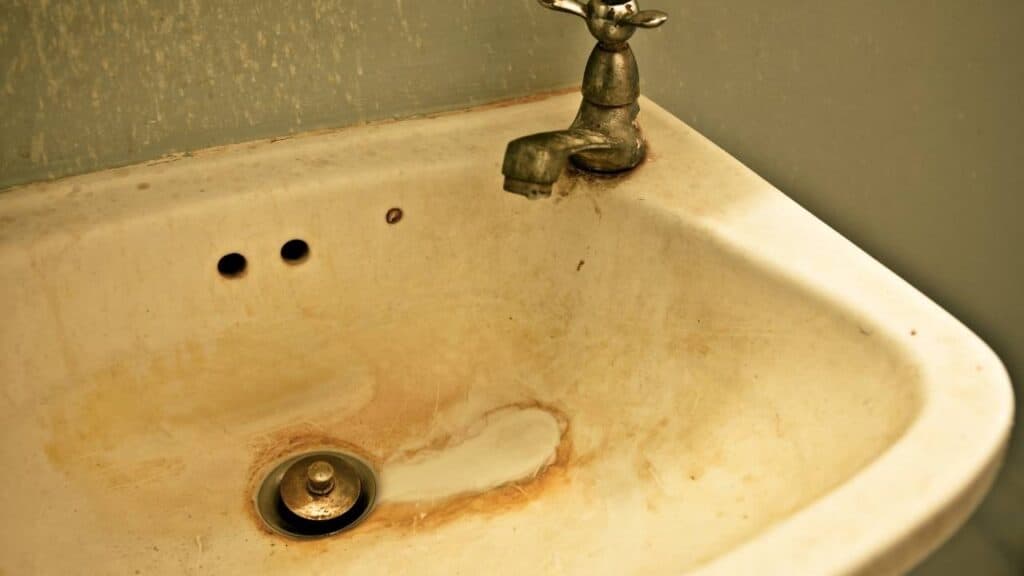
Staining can occur when iron oxidizes, causing iron particles to deposit on surfaces like sinks and toilets.
Iron can also clog water pipes and cause an unpleasant odor as it rusts the metal inside of those pipes. Iron clogging may reduce your water pressure.
In addition, iron can cause corrosion in water heaters and appliances like washing machines or dishwashers.
Frequently asked questions
What is an iron filter for well water?
An iron filter is a device that attaches to the wellhead and removes iron from water as it comes out of your pump. Iron filters for well water usually attach directly to the pipes coming in (point of entry).
How does iron get into my well water?
Iron is a common contaminant in groundwater, and iron can cause health problems if it builds up over time. Iron usually gets into well water as iron oxide from the soil or bedrock just below your wellhead.
How do iron filters work?
Most iron filters work by oxidation. The iron filter contains iron oxide in the form of a powder or granules, which reacts with well water to remove iron from it as you pump water into your home. Air injection and water softening are also common ways to remove iron.
Do I need an iron filter?
Iron filters are usually recommended for water sources containing over 0.25 parts per million iron. Ultimately you need to decide how much iron is too much for you and your family.
Do whole house water filters remove iron?
Not all whole house filters will remove iron. You’ll need to choose a system that is designed specifically for removing iron.
What other contaminants can iron filters remove?
Iron filters can usually also remove hydrogen sulfide, manganese, and iron bacteria. Some systems come with several stages that can remove sediment, dust and debris, chemicals, chlorine, and other common contaminants.
Say goodbye to stains and unpleasant drinking water
Iron in well water clogs pipes, tastes bad, stains clothes and surfaces, and can even have some negative health effects for some people.
A whole-house iron filter can solve all of this. And also eliminates hydrogen sulfide, manganese, and sediment from your well water.
The best overall whole-house filter for removing high levels of iron in well water is the SpringWell Well Water Iron Filter.
I hope this has helped you choose the best filter for your iron-contaminated well water. Enjoy!

